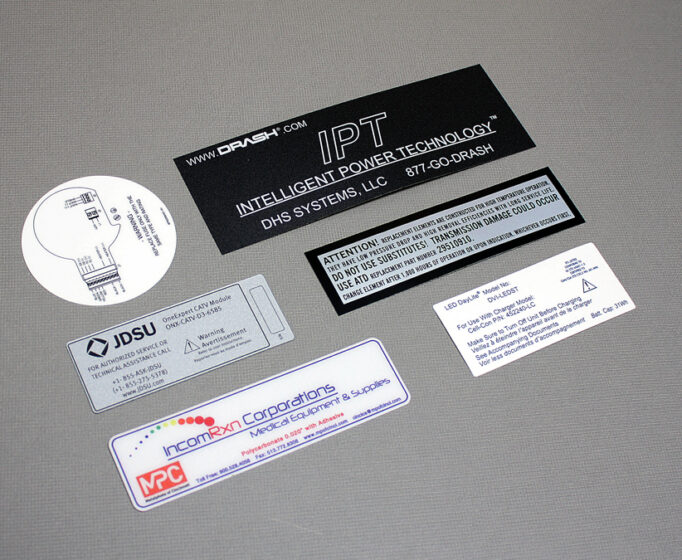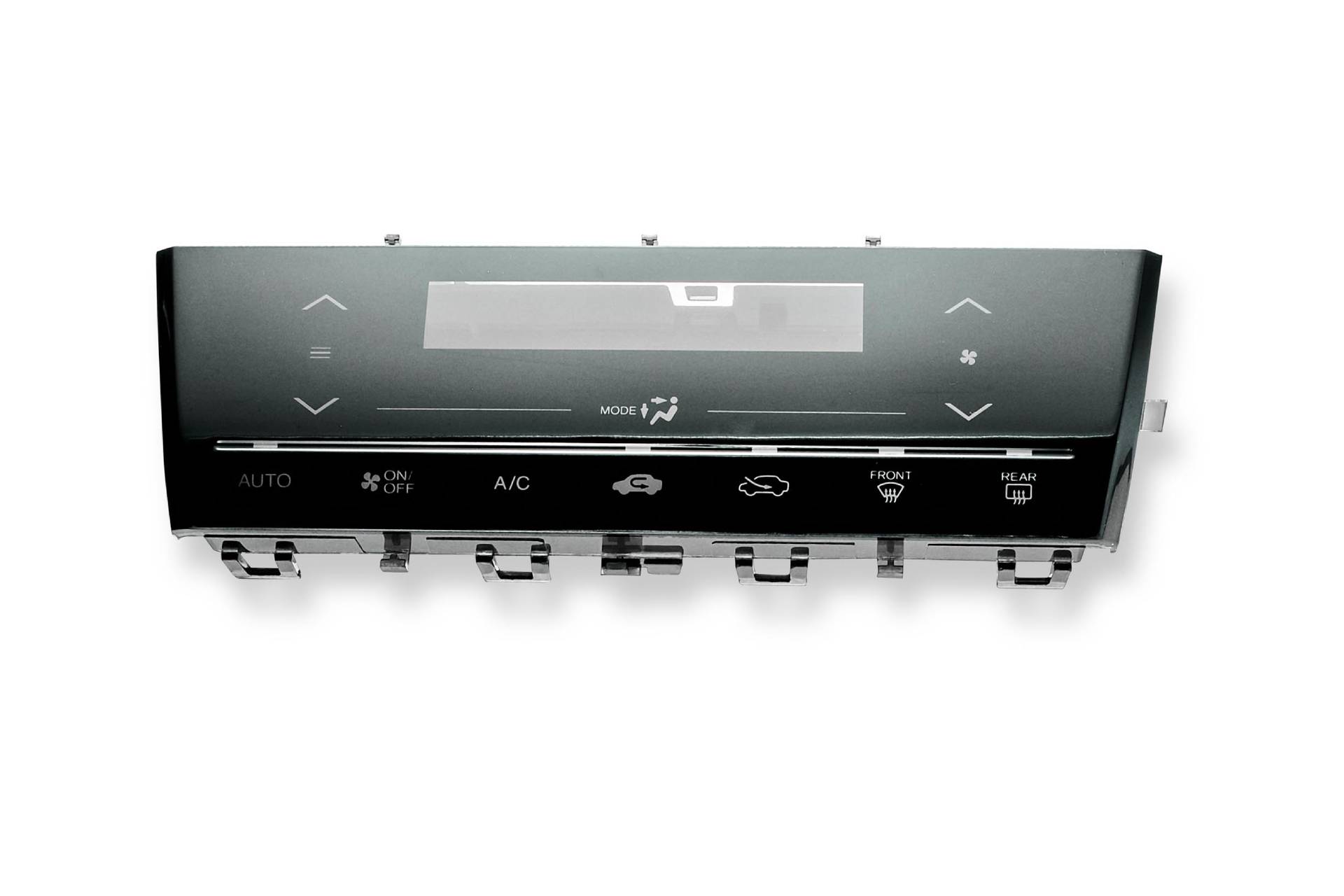How Plastic Nameplates Are Made: A Comprehensive Guide to Their Manufacturing Process
The production of plastic nameplates entails a number of exact steps, beginning with the option of suitable products to the final finishing touches. Each stage is essential, making sure the product satisfies particular requirements for resilience and visual appeals. Different production techniques play a substantial duty in crafting these nameplates. Recognizing these processes can clarify the intricacies behind what may look like a simple product. What factors contribute to the high quality and personalization of these nameplates?
Understanding Plastic Products Used for Nameplates

The Design Refine: From Principle to Prototype
The style procedure for plastic nameplates starts with a clear principle that overviews the overall production. Designers work together with customers to define the function, design, and details requirements of the nameplate. This initial stage consists of brainstorming sessions, sketching ideas, and selecting shades and typefaces that straighten with branding goals.Once the concept is established, developers use computer-aided design (CAD) software program to develop comprehensive digital representations. These models enable for visualization and adjustments prior to progressing. Comments from stakeholders is essential during this stage, as it assists refine the design to satisfy expectations.After finalizing the digital prototype, a physical design may be generated, frequently with methods like 3D printing. This concrete depiction enables additional evaluation of aesthetic appeals and capability. On the whole, the layout process is a crucial action that lays the structure for the efficient manufacturing of top quality plastic nameplates.
Cutting and Forming the Plastic
In the cutting and forming stage of plastic nameplate production, the choice of products plays a vital function in figuring out the final item's quality and longevity (Plastic Nameplates). Various precision cutting strategies, such as laser cutting and CNC machining, assurance that the plastic is formed with precision and uniformity. This combination of careful material selection and advanced reducing methods is essential for creating high-grade nameplates

Material Selection Refine
Picking the right product is vital for producing premium plastic nameplates. Different types of plastics are available, each offering unique benefits and qualities. Common options consist of acrylic, polycarbonate, and PVC. Acrylic is favored for its quality and UV resistance, making it perfect for exterior applications. Polycarbonate, understood for its durability and influence resistance, appropriates for settings that require improved defense. PVC is frequently chosen for its cost-effectiveness and convenience in design. The option process also takes into consideration aspects such as color, thickness, and surface area coating, which can substantially influence the final appearance and performance of the nameplate. Inevitably, the chosen material has to align with the intended use and visual goals of the plastic nameplate.
Accuracy Trimming Methods
While picking the ideal material prepares, precision reducing methods play a vital function fit the plastic nameplates into their final types. Different techniques, including laser cutting, CNC milling, and pass away cutting, are employed to achieve accuracy and uniformity. Laser reducing makes use of concentrated light to produce intricate styles and clean edges, suitable for complicated patterns. CNC milling uses adaptability by removing excess product with precision, fitting different thicknesses and forms. Die cutting, on the various other hand, permits for mass manufacturing of consistent pieces, enhancing effectiveness. Each technique is selected based upon the design specs and the wanted surface, making certain that the end product satisfies high quality standards and customer expectations while keeping resilience and aesthetic charm.
Printing Techniques for Customization
How can makers attain precise and vivid designs on plastic nameplates? The response exists in various printing strategies customized for personalization. Digital printing has actually acquired appeal due to its capability to produce high-resolution pictures and complex layouts directly onto plastic surfaces. This approach permits fast turnaround times and marginal configuration costs, making it suitable for short runs and personalized orders.Screen printing stays an additional extensively made use of method, especially for larger amounts. It involves developing a pattern and applying layers of ink, causing rich colors and resilience. UV printing, which utilizes ultraviolet light to cure the ink, is check these guys out likewise reliable, offering outstanding attachment and resistance to fading.Additionally, pad printing supplies versatility for irregularly shaped nameplates, enabling thorough layouts on tough surfaces. These printing approaches allow makers to fulfill diverse customer requires while making certain quality and Website durability in their plastic nameplate items.
Surface Area Therapies and Finishing Options

Quality Assurance Procedures in Manufacturing
Ensuring the greatest criteria of quality assurance throughout the production of plastic nameplates is necessary for preserving item integrity and consumer contentment. Suppliers execute extensive inspection methods at different stages of the production process. Raw products go through thorough screening to validate they fulfill requirements for longevity and shade uniformity. During the molding phase, automated systems monitor criteria such as temperature level and pressure to stop defects.In enhancement, visual inspections are conducted to recognize any surface area flaws or imbalances. Once the nameplates are created, they undergo functional examinations, consisting of adhesion tests for published aspects and cardiovascular test for durability. Quality assurance groups often employ statistical tasting techniques to examine sets, ensuring that any type of deviations from standards are immediately dealt with. This detailed method not just improves item quality yet likewise fosters depend on with customers, affirming the supplier's commitment to quality in every nameplate generated.
Packaging and Circulation of Finished Nameplates
The product packaging and circulation of ended up plastic nameplates are important actions in guaranteeing they reach consumers in excellent condition. Different product packaging products are chosen to shield the nameplates during transit, while delivering techniques are meticulously chosen based on performance and cost-effectiveness. Furthermore, efficient storage space services are implemented to keep top quality till the nameplates are supplied.
Product Packaging Materials Used
Selecting suitable packaging products is necessary to guarantee their protection throughout transportation when distributing finished plastic nameplates. Commonly utilized products include bubble these details cover, foam extra padding, and cardboard boxes, all designed to support the nameplates against effects and shocks. Bubble wrap supplies an adaptable barrier, while foam cushioning warranties that nameplates continue to be firmly in position, decreasing the danger of scrapes or damage. Additionally, durable cardboard boxes are made use of to include the nameplates, offering architectural support and protection from outside elements. Tags might be related to suggest handling instructions or vulnerable materials, additionally improving safety throughout transport. Overall, making use of high-grade packaging products considerably adds to the stability and discussion of the ended up plastic nameplates upon arrival at their destination.
Shipping Techniques Used
Effective circulation of completed plastic nameplates relies upon various delivery approaches that guarantee prompt and safe and secure shipment. Firms typically use courier services, products delivery, and postal solutions, depending on the size, weight, and location of the plans. For neighborhood distributions, courier solutions supply quick transportation, guaranteeing nameplates get to consumers rapidly. For larger orders, products shipping is chosen, using trucks or shipping containers to carry mass amounts successfully. Post offices act as an economical option for smaller shipments, particularly for domestic shipments. All shipping approaches focus on safety packaging to avoid damages during transit. Tracking systems are additionally made use of to monitor shipments, offering clients with real-time updates and reassurance regarding the status of their orders.
Storage Solutions Implemented

Frequently Asked Inquiries
What Kinds Of Organizations Commonly Utilize Plastic Nameplates?
Plastic nameplates are frequently made use of by various businesses, including offices, factories, colleges, and health centers. These nameplates serve crucial features such as identification, info screen, and branding, adding to business performance and specialist appearance across varied atmospheres.
The length of time Does the Entire Manufacturing Refine Take?
The production process period varies based on intricacy and amount, normally ranging from a couple of days to a number of weeks. Elements influencing this timeline consist of layout approval, material availability, and manufacturing methods used by the firm.
Can Plastic Nameplates Be Recycled After Use?
Plastic nameplates can be reused, provided they are made from recyclable materials. However, the schedule of recycling programs and regional guidelines might affect their recyclability. Proper disposal practices are important to assure effective recycling.
What Are the Ecological Impacts of Plastic Nameplate Manufacturing?
The environmental effects of plastic nameplate manufacturing include carbon discharges, source depletion, and pollution from producing processes. Plastic Nameplates. Furthermore, improper disposal adds to plastic waste, adversely impacting ecosystems and wildlife, highlighting the requirement for sustainable practices
Are There Any Type Of Safety And Security Problems With Plastic Nameplates?
Safety and security problems concerning plastic nameplates mainly entail potential chemical exposure during production and the threat of products degrading with time, which might bring about hazardous materials being released, affecting both human health and the setting. While various materials can be used for nameplates, plastic remains a preferred option due to its adaptability and toughness. In the cutting and forming stage of plastic nameplate manufacturing, the selection of products plays a necessary function in identifying the last product's quality and sturdiness. Selecting the right product is crucial for producing top quality plastic nameplates. While choosing the ideal material lays the foundation, accuracy cutting strategies play a crucial function in shaping the plastic nameplates right into their last forms. When distributing finished plastic nameplates, selecting proper packaging materials is important to assure their protection throughout transit.